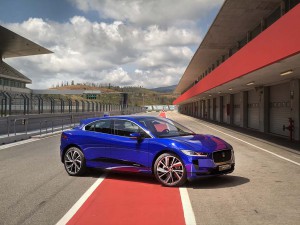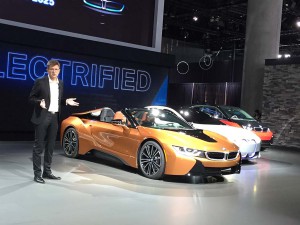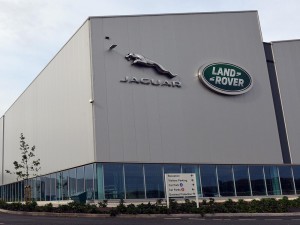
Despite its success with electric vehicles like the Jaguar I-Pace, Jaguar Land Rover is partnering with BMW it accelerate its technology development curve.
BMW and Jaguar Land Rover will team up to develop next-generation electric drive systems, the two automakers announced Wednesday, a move that underscores both the industry’s push into new technologies like electrified and autonomous driving, as well as the push by manufacturers to form joint ventures to share costs and speed up development.
BMW was one of the pioneers in electrification with products like the battery-powered i3 and i8 plug-in hybrid, but it has lost momentum during the last several years as competitors – including Jaguar with its all-electric i-Pace – have begun launching a wave of new battery-cars.
“We’ve proven we can build world-beating electric cars but now we need to scale the technology to support the next generation of Jaguar and Land Rover products,” said Nick Rogers, JLR’s Engineering Director. “It was clear from discussions with BMW Group that both companies’ requirements for next generation EDUs to support this transition have significant overlap making for a mutually beneficial collaboration.”
Some joint programs, such as those pairing Renault and Alliance partner Nissan, have seen manufacturers team up to develop common platforms that they can share. In the case of the BMW-JLR project, the two companies will focus on the electric motors, transmissions and power electronics used in their individual vehicles, while also partnering on the purchase of components. That would help them lower costs, something critical at a point when battery-cars sales remain extremely low.
(Jaguar snags three World Car awards in NYC. Click Here for the story.)
The electronic drive units, or EDUs, they develop will be manufactured independently at each of the companies’ own production facilities, they said in a statement. JLR’s, for example, is in Wolverhampton, England, about 115 miles from London. That complex already produces the technology used in the I-Pace, the all-electric SUV that recently was named World Car of the Year by a jury of 82 journalists.

BMW mobility chief Klaus Froehlich with the new i8 Roadster, the Next Vision concept and the i3s at the LA Auto Show last November.
Exactly how the new partnership will change prior product development plans is unclear, as is the specifics each of the two companies will bring to the table. Andreas Cremer, a Munich-based spokesman for BMW said much of the project remains proprietary and the two partners have yet to meet to precisely formalize where they hope to go.
As to where the two carmakers currently stand, the Jaguar I-Pace follows a model adopted by Tesla and a number of other manufacturers, with a unique, electric-only platform. Resembling an oversized skateboard, it places its battery pack below the load floor, along with motors on the front and rear axle.
Earlier this year, BMW officials offered journalists a backgrounder on their electrification efforts, among other things showing off some of the technologies they were already developing for future, all-electric models such as the iX3 and iNext crossovers.
While the automaker originally opted for the electric-only platform strategy, it said future models will use a more flexible platform that could mount gas or diesel engines in the conventional manner, place batteries and motors below the load floor or pair both for plug-in hybrids.
The Bavarian marque last year said all of its products would be offered with some form of electrified drivetrain technology by 2030. Currently, BMW is finalizing development of its fifth-generation drive system to debut in the iX3. Individual models would be able to use up to three motor drive packs, one in front and two in the rear.
(Click Here for our first look at the 2020 Jaguar XE.)
Together, that would allow up to a combined 750 kilowatts of power, or roughtly 1,000 horsepower, “which is M-car territory,” said tech spokesman Tom Plucinsky. BMW is estimating that some versions of its products could see 0-to-60 mph times of well under 3 seconds.

BMW and Jaguar Land Rover will develop their own EDUs as part their new partnership. JLR will build it's version at its Wolverhampton, England plant.
Even while maintaining different approaches to how their final products are engineered, BMW board member Klaus Froehlich said, “Together, we have the opportunity to cater more effectively for customer needs by shortening development time and bringing vehicles and state-of-the-art technologies more rapidly to market.”
The joint venture is not “a very short-term project,” spokesman Cremer told TheDetroitBureau.com. Without offering precise details, however, he indicated it would likely not impact BMW projects until it’s time to launch its gen-six electric drive system.
The decision to pair up is far from unusual these days. BMW has already formed several joint ventures with traditional rival Daimler AG, most notably one involving their various mobility services efforts. Among other things they will now combine ride and car-sharing operations around the world.
Ford announced the first in what is expected to be a series of partnerships with Volkswagen AG in January. The two carmakers initially will focus on commercial vehicles but are also negotiating terms on further efforts that they hope will include battery-electric vehicles.
General Motors has launched two partnerships with Honda, one focusing on the development of hydrogen fuel-cell technology, the other focused on autonomous vehicles.
(To get a look at the new BMW M versions of the X5 and X7, Click Here.)
Fiat Chrysler Automobiles has teamed up with Google spinoff Waymo on self-driving efforts and, last month, proposed a merger with Renault. The French automaker says it is receptive to that proposal though its board on Tuesday delayed a formal plan that would move the effort forward.
